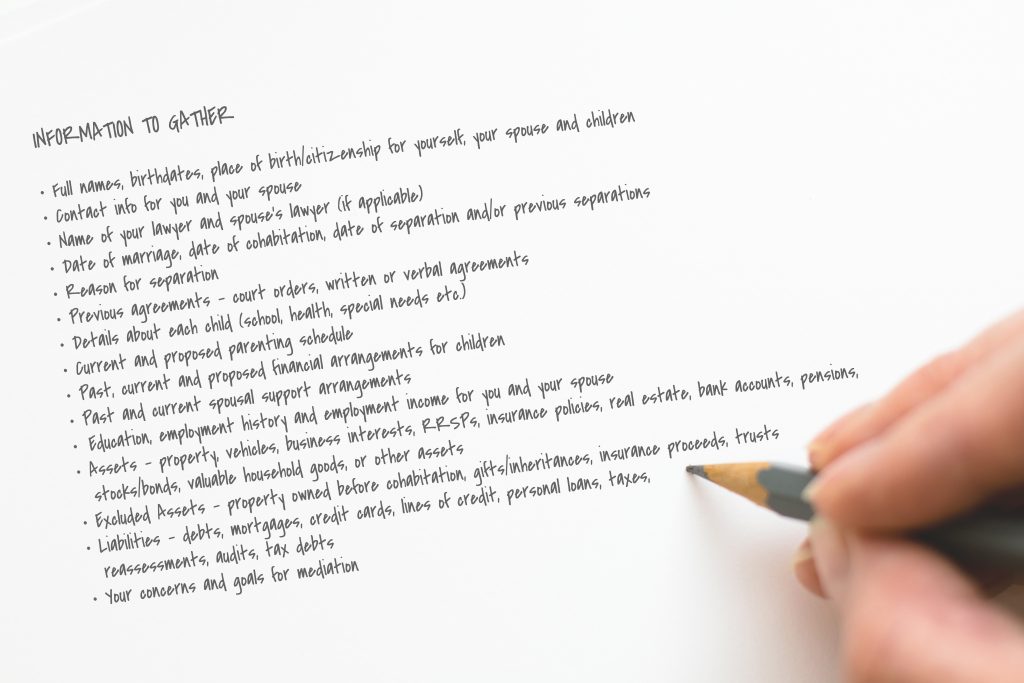In an effort to create an open and informative dialogue about mediation for participants, Christine Murray and Lisa Arora have come together to create a unique 12-part blog series that combines their insights into a comprehensive view of mediation.

Christine Murray practices exclusively in the area of family law and has extensive experience in negotiation, mediation, and litigation. She has acted as counsel for parties at countless mediations and has taught family law as an Adjunct Professor at the Peter Allard School of Law (University of British Columbia).
Lisa Arora is an internationally recognized expert in the field of graphic facilitation and a comprehensive family mediator who uses visuals to enhance communication and foster productive, mutually beneficial agreements during mediation.
The intention of this series is to provide answers to questions that people considering family mediation often ask themselves while evaluating the legal, emotional, and practical aspects of working with a mediator versus other options available to families facing conflict, separation, or divorce.
How to Get the Most Out of Independent Legal Advice Before & After Family Mediation
Let’s imagine you have decided to participate in mediation without a lawyer present (this is very common). It is strongly recommended that you get independent legal advice both before mediation and again after your mediation, prior to signing any agreement.
Here are some tips on:
- choosing a lawyer that is a good fit for you;
- working effectively with a lawyer; and
- making the best use of your time during lawyer meetings – learning your rights and responsibilities;
Choosing a Lawyer to Advise You
- Be sure to select a lawyer that is up to speed on family law and aware of the current legislation and case law – someone who practices in family law regularly;
- Look for a lawyer who has experience working with clients in mediation and who is supportive of the process;
- As you are only seeking limited legal advice, ensure you find a law firm that offers unbundled services. This means your lawyer will consult with you and perform certain tasks at an hourly rate on a pay-as-you-go basis. Generally, you will not have to pay a large retainer in the first meeting; (https://www.clicklaw.bc.ca/helpmap/service/1197)
- Ask trusted friends or family for recommendations and read lawyer reviews.
What to Expect at Your Consultation With a Lawyer
When you call or e-mail to schedule your consultation, with a lawyer they will likely be very up front about their fees. Get payment details in writing before you show up for your first meeting.
Many lawyers will have an intake questionnaire for you to fill out before your consultation. This is to help them understand the relevant background of your situation in advance so they can focus your in-person time on analyzing your case and advising you. It will also expedite the information gathering process so you have more time to ask questions.
If you’re asked to fill out a questionnaire, complete it to the best of your ability and return it promptly so your lawyer has time to review it before your meeting.
If your lawyer doesn’t use an intake questionnaire, here’s some information you can organize to be prepared for your meeting:

During the consultation, expect a two-way conversation. Your lawyer will have questions for you and you’re going to have questions for them. Throughout the discussion, your lawyer will help evaluate your options, provide you legal information and give you suggestions to help you prepare for your mediation.
Some Questions to Ask and Topics to Cover During Your Consultation
- What’s the range of possible outcomes (best-middle-worst) for my situation based on the law?
- What do you think is a reasonable outcome in terms of financial settlement?
- If you have certain objectives (for example, keeping the family home), your lawyer will likely ask questions to help determine what is underlying this position (what is your interest – for example do you want to remain in the family home because you think it will increase in value and you will make money?).
- Discuss multiple options for how you could meet your objectives and interests and various ways of structuring a settlement to meet your interests. This will provide you with more flexibility to negotiate (for example, are there ways to meet your interests without keeping the family home).
- Figure out the main issues you want to focus on and which are more important for your situation. (For instance, consider the impact a pension will have on your future vs. dividing travel points. Decide which hills are not worth dying on.)
- Are there specific matters you cannot deal with on your own (for example tax issues or properties held with third parties)? Consider what information/advice you need and which other professionals you should consult before going to mediation.
- Ask your lawyer, based on their experience, what you should expect at mediation.
- Learn what the strengths and weaknesses/risks in your case are.
- Discuss the costs (financial and emotional) associated with each dispute resolution process you could use for resolving your case as well as the timeframe for each of those processes (i.e. mediation, court processes or arbitration etc.).
Keep in mind that you can book further consultations if you leave your first meeting feeling that you need more time to consider your options or need more information. If necessary or desired, you and your lawyer can meet multiple times to clarify questions and prepare for negotiations in mediation. Also, keep in mind that you can consult with your chosen lawyer on an as-needed basis during mediation (however you will need to pre-arrange this to ensure the lawyer is available during your mediation, or between a series of mediation sessions).
The goal of working with a lawyer before mediation is to get to a place where you feel knowledgeable and confident that you can negotiate a fair, durable agreement.
A good legal adviser can coach you in negotiating techniques, and help you think up creative solutions to propose. After all, you don’t want to make agreements that are imbalanced or could be overturned in court years later. Depending on your confidence in the advice you receive, this may involve seeking the opinion of more than one family lawyer.
Consulting With a Lawyer After Mediation
After you’ve mediated, your mediator will most likely provide you with a summary of the agreements you reached during the process and a list of outstanding issues (if any remain unresolved). To protect yourself and your interests, make sure you seek independent legal advice before signing off on any agreements.
Mediation allows parties to be creative with the way they decide to resolve issues and construct settlement terms. If any terms of your agreement are unconventional or atypical, explain your reasoning and motivation for these arrangements up front so your lawyer doesn’t head down the path of advising you not to sign your agreement as a result. This will help your lawyer understand your thought process and interests in signing an agreement they could advise against.
Important! No matter what any lawyer advises, it’s always up to you to decide.
At your post-mediation consultation with your lawyer, expect them to:
- Review the mediation summary to make sure it accurately reflects what you agreed to/wish the document to say.
- Review parenting arrangements to consider the best interest of the child(ren).
- Inspect financial agreements to ensure they fall within the reasonable range. They will also double check that valuation dates, deductions, exclusions and any equalization calculations are correct, and that any backup documentation supports the figures.
- Identify and explain where agreements depart from the scheme of a Family Law Act, and make sure you have a sound, valid reason for those choices.
- Help you execute your separation agreement and finalize concluding steps. This may mean drawing up a separation agreement or consent order for both parties to sign, or applying for a divorce.
By working with a lawyer before and after mediation, you can gain a clearer understanding of what the mediation process involves, and learn how to ensure you get the best possible outcome.
If you have more questions about how to decide whether you should secure legal counsel for your mediation, or if you want information on visual mediation, contact us at http://lisaarora.com/contact/
Important: Please note that this blog series is written in the context of providing information about family mediation and is not intended as legal advice. We recommend you seek legal counsel before making any major decisions about your personal legal circumstances, separation or divorce.


Thank you so much for helping me understand more about getting the most out of independent legal advice after mediation. Just like you said, you will need to find a lawyer who is up to speed on current family laws and are aware of the legislation and case laws. A friend of mine has been looking for a family lawyer for a couple days now, and I think that this information would really help her find a competent lawyer quickly. Thanks again!